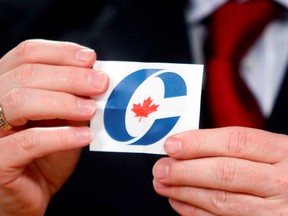Nearly one year ago, the Conservative Party of Canada elected its new leader, Pierre Poilievre. The event preceding his coronation was lined with the favoured rituals of progressive politics; it opened with the singing of the national anthem, followed by a land acknowledgement noting the event’s location on unceded Algonquin territory and a four-minute Indigenous blessing.
Politics
Jamie Sarkonak: Maple Leafs coach Sheldon Keefe signs

One proposal would specify that the party constitution’s usage of “equality” refers to equal opportunities — not equal outcomes, which is the common progressive understanding of the term. Another such amendment would affirm “the existence of only one human race” as a nod to merit-based, race-neutral policy.
Numerous proposed changes to the policy book would take an anti-DEI stance in universities, workplaces and the public service. One suggests an accord between the feds and the provinces to ensure free speech is protected in the academe — a nice idea in theory, but what’s really needed is restrictions on federal grants to the ever-growing field of academic activism.
In workplaces generally, another proposal would reject any kind of “forced political, cultural or ideological” training. While this would be an improvement to the status quo, it would fall far short of paring back the ideological laws that encourage race-based hiring (specifically, the Employment Equity Act that normalized identity-based workplace policies in the first place).
“Those employed in the public sector, unions or self-regulated trades/professions should not be forced to make affirmations, or participate in ideological programs, as a condition of employment or practice,” reads the proposal.
Another policy change would spurn the new emphasis on identity by federal research funding agencies when it comes to handing out awards and hiring people. Instead, it would direct that merit be the primary driver of these choices. It’s a laudable first step, but more effective would be the revocation of funding for any grants awarded under the auspices of DEI.
On gender, the party is being asked to contemplate where it falls on expression, identity and biological sex. One policy would define “woman” in the policy book as “adult female” and affirm the right of women to single-sex spaces, such as in prisons, shelters, locker rooms, washrooms, sports, awards, grants and scholarships. Another would ban “altering medicinal or surgical interventions on minors under 18 to treat gender confusion or dysphoria.”
These proposals are a far cry from the party’s approach to gender and kids in 2021, which involved hastily supporting a conversion therapy ban through Parliament. That bill, notably, only banned the “conversion” of trans-identified children into their biological sex. It did not ban the “conversion” of children comfortable with their biological sex into being transgender.
Since then, other jurisdictions like the United Kingdom have cracked down on the trendy but scientifically questionable practice of unrestricted gender affirmation. Similarly, data on gender-neutral facilities have, at least in the U.K., shown to carry a significantly higher risk of violence.
On crime and urban decay, members are asking the party to formalize a tougher stance. One proposal seeks harsher punishment for pedophilia-related crimes (which could very easily be struck down by the courts, but the idea is nice). Another would have breaching parole conditions made into a crime — because it isn’t at present. Another demands stricter bail laws.
These approaches to crime are being paired with a push for treatment-focused addictions policies in the wake of the country’s rising opioid crisis. One policy proposal calls for a national addictions strategy. Another calls for treatment programs and “not to provide the person with easier access to drugs by drug consumption sites or decriminalizing drugs.”
In response to the threat of foreign interference, one policy proposal would ban military co-operation and research participation with China, while ending Chinese ownership in Canadian companies. More generally, a number of pro-military proposals will be debated: one seeks a change to the party constitution that would “promote a well-armed military;” one would have Canada try to join additional military alliances; and one calls for a national cybersecurity standard.
On a more positive note, a common theme that can be gleaned from other proposals is the desire of Canadians to build. One proposal asks for an Arctic naval base, while another seeks a Hudson Bay port. Others support high-speed passenger rail and the construction of more transport capacity to move product to port. Party members’ approach to energy, meanwhile, focuses on improving technology, rather than taxation) and researching carbon capture technology, battery-based storage and small modular reactors.
At this point, we can’t know what will and what won’t pass into the party’s constitution and policy book. But overall, the sampling of what’s on the table broadly reflects the issues of today.
Interestingly, the membership has less to say about affordability. One proposal, to assist Canadians navigating the housing shortage, would push for rental payment history to be factored into mortgage considerations. Another would cap capital gains taxes to a lifetime maximum of $1 million rather than having the 50 per cent rate follow everyone around for a lifetime (a move that, surely, would help make Canada more affordable for the rich at least). More reasonable is a suggestion to bump the floor for small business GST registration to $47,000 from the current $30,000.
Absent from the slate of proposals is family policy — something one might expect in a country that can no longer seem to sustain its population without immigration. One proposal supports the removal of GST from maternity and newborn expenses, but that’s about it.
Party members are mostly mum on family formation, but many proposals are being put forth to help seniors instead. Proposals call for a national senior strategy, for palliative care to be declared a right in the Canada Health Act, for increased benefits, tax credits and financial assistance and for income splitting of retirement income before age 65. One even calls for the elimination of income taxes for those aged 65 or older. Hungary, meanwhile, has instituted tax exemptions for large families and young mothers. With nearly no natural population growth, one might expect Conservatives to take a similar approach.
It’s great that the Conservatives are no longer ceding cultural policy to the Liberals. It’s also great that the party membership is looking to solve Canada’s problems by building out infrastructure while not caving to progressive dogmas on crime. It will be a victory if the party membership formally moves the needle on these issues in September — in the long term, though, a firm stance on cultural policy should be paired with a firm stance on supporting young families.

Politics
Youri Chassin quits CAQ to sit as Independent, second member to leave this month

Quebec legislature member Youri Chassin has announced he’s leaving the Coalition Avenir Québec government to sit as an Independent.
He announced the decision shortly after writing an open letter criticizing Premier François Legault’s government for abandoning its principles of smaller government.
In the letter published in Le Journal de Montréal and Le Journal de Québec, Chassin accused the party of falling back on what he called the old formula of throwing money at problems instead of looking to do things differently.
Chassin says public services are more fragile than ever, despite rising spending that pushed the province to a record $11-billion deficit projected in the last budget.
He is the second CAQ member to leave the party in a little more than one week, after economy and energy minister Pierre Fitzgibbon announced Sept. 4 he would leave because he lost motivation to do his job.
Chassin says he has no intention of joining another party and will instead sit as an Independent until the end of his term.
He has represented the Saint-Jérôme riding since the CAQ rose to power in 2018, but has not served in cabinet.
This report by The Canadian Press was first published Sept. 12, 2024.
The Canadian Press. All rights reserved.
Politics
‘I’m not going to listen to you’: Singh responds to Poilievre’s vote challenge

MONTREAL – NDP Leader Jagmeet Singh says he will not be taking advice from Pierre Poilievre after the Conservative leader challenged him to bring down government.
“I say directly to Pierre Poilievre: I’m not going to listen to you,” said Singh on Wednesday, accusing Poilievre of wanting to take away dental-care coverage from Canadians, among other things.
“I’m not going to listen to your advice. You want to destroy people’s lives, I want to build up a brighter future.”
Earlier in the day, Poilievre challenged Singh to commit to voting non-confidence in the government, saying his party will force a vote in the House of Commons “at the earliest possibly opportunity.”
“I’m asking Jagmeet Singh and the NDP to commit unequivocally before Monday’s byelections: will they vote non-confidence to bring down the costly coalition and trigger a carbon tax election, or will Jagmeet Singh sell out Canadians again?” Poilievre said.
“It’s put up or shut up time for the NDP.”
While Singh rejected the idea he would ever listen to Poilievre, he did not say how the NDP would vote on a non-confidence motion.
“I’ve said on any vote, we’re going to look at the vote and we’ll make our decision. I’m not going to say our decision ahead of time,” he said.
Singh’s top adviser said on Tuesday the NDP leader is not particularly eager to trigger an election, even as the Conservatives challenge him to do just that.
Anne McGrath, Singh’s principal secretary, says there will be more volatility in Parliament and the odds of an early election have risen.
“I don’t think he is anxious to launch one, or chomping at the bit to have one, but it can happen,” she said in an interview.
New Democrat MPs are in a second day of meetings in Montreal as they nail down a plan for how to navigate the minority Parliament this fall.
The caucus retreat comes one week after Singh announced the party has left the supply-and-confidence agreement with the governing Liberals.
It’s also taking place in the very city where New Democrats are hoping to pick up a seat on Monday, when voters go to the polls in Montreal’s LaSalle—Émard—Verdun. A second byelection is being held that day in the Winnipeg riding of Elmwood—Transcona, where the NDP is hoping to hold onto a seat the Conservatives are also vying for.
While New Democrats are seeking to distance themselves from the Liberals, they don’t appear ready to trigger a general election.
Singh signalled on Tuesday that he will have more to say Wednesday about the party’s strategy for the upcoming sitting.
He is hoping to convince Canadians that his party can defeat the federal Conservatives, who have been riding high in the polls over the last year.
Singh has attacked Poilievre as someone who would bring back Harper-style cuts to programs that Canadians rely on, including the national dental-care program that was part of the supply-and-confidence agreement.
The Canadian Press has asked Poilievre’s office whether the Conservative leader intends to keep the program in place, if he forms government after the next election.
With the return of Parliament just days away, the NDP is also keeping in mind how other parties will look to capitalize on the new makeup of the House of Commons.
The Bloc Québécois has already indicated that it’s written up a list of demands for the Liberals in exchange for support on votes.
The next federal election must take place by October 2025 at the latest.
This report by The Canadian Press was first published Sept. 11, 2024.
The Canadian Press. All rights reserved.
Politics
Social media comments blocked: Montreal mayor says she won’t accept vulgar slurs

Montreal Mayor Valérie Plante is defending her decision to turn off comments on her social media accounts — with an announcement on social media.
She posted screenshots to X this morning of vulgar names she’s been called on the platform, and says comments on her posts for months have been dominated by insults, to the point that she decided to block them.
Montreal’s Opposition leader and the Canadian Civil Liberties Association have criticized Plante for limiting freedom of expression by restricting comments on her X and Instagram accounts.
They say elected officials who use social media should be willing to hear from constituents on those platforms.
However, Plante says some people may believe there is a fundamental right to call someone offensive names and to normalize violence online, but she disagrees.
Her statement on X is closed to comments.
This report by The Canadian Press was first published Sept. 11, 2024.
The Canadian Press. All rights reserved.
-

 News20 hours ago
News20 hours agoSingh claps back at Poilievre ahead of House return
-

 News19 hours ago
News19 hours agoMore than 67 million people watched Donald Trump and Kamala Harris debate. That’s way up from June
-

 News19 hours ago
News19 hours agoTaxi driver suspected in fatal B.C. hit-and-run has left Canada: RCMP
-

 News20 hours ago
News20 hours agoMounties say there’s no evidence Lytton, B.C., wildfire was arson; cause unknown
-

 News19 hours ago
News19 hours agoThe ancient jar smashed by a 4-year-old is back on display at an Israeli museum after repair
-

 News19 hours ago
News19 hours agoSouthern Baptist trustees back agency president but warn against needless controversy
-
News7 hours ago
Local Toronto business story – Events Industry : new national brand, Element Event Solutions
-

 News8 hours ago
News8 hours agoReggie Bush was at his LA-area home when 3 male suspects attempted to break in




























